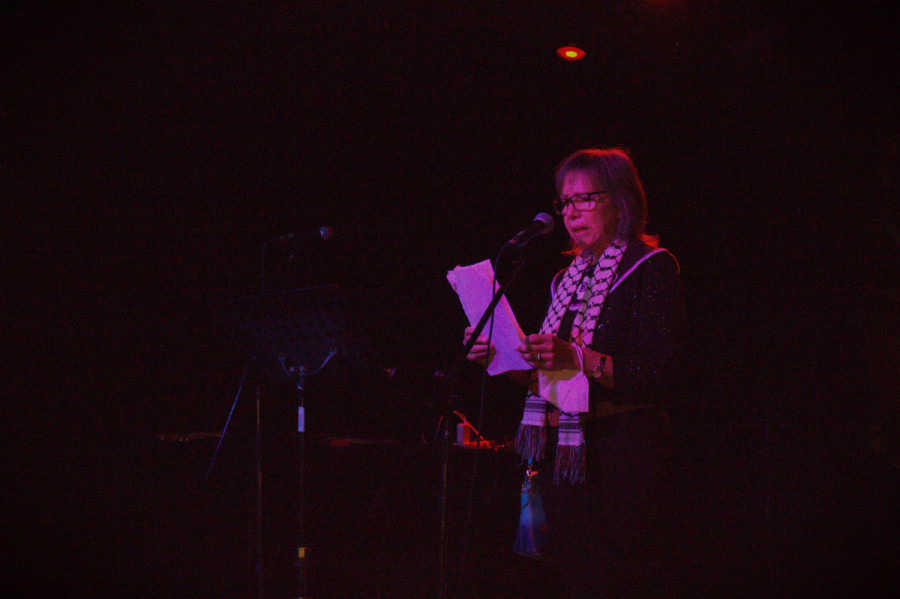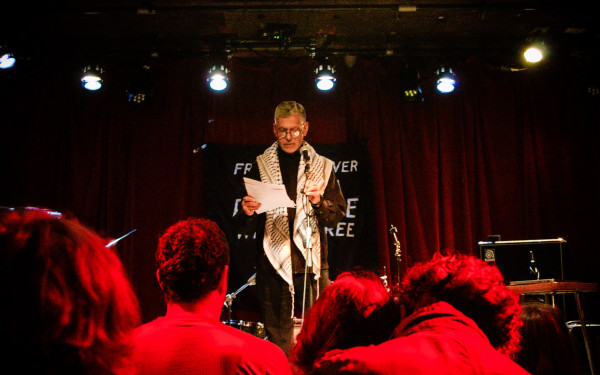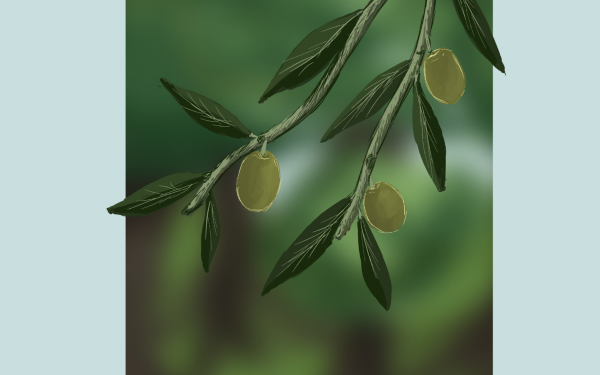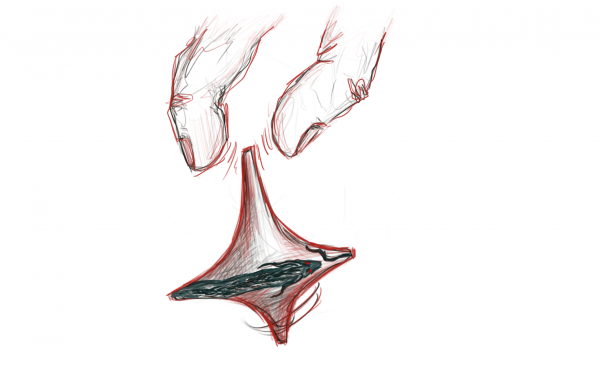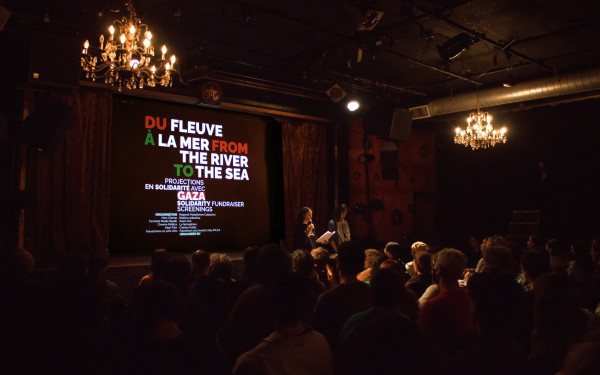Resisting with echoes of love: La Sotterenea hosts beaconing Palestinian voices
Parole de résistance pour une Palestine libre: The Decolonial Love Circle explores poetry with an intersectional lens
The Decolonial Love Circle orchestrated an emotionally charged evening at La Sotterenea on Nov. 19. The venue was transformed for four hours into a metaphorical megaphone that reverberated Palestinian voices far beyond its physical confines.
With beams of red light illuminating the dark and packed room, the crowd experienced stirring poetry readings and musical performances, fostering a collective emotional response.
The semi-organized open mic format, coupled with the invitation for voluntary donations to the Palestinian Youth Movement, created a dynamic and impactful space for artistic expression. Beyond the performances, the event fostered socialization, encouraging connections and potential collaborations among attendees, contributing to a shared narrative of solidarity.
Despite operating on zero funds and minimal promotion, the event—adorned with Maktaba Bookshop’s selection of goods—showcased resilience through its simplicity. Blending softness and rage, the night featured artists, poets and writers, uniting in solidarity to amplify the voices of the oppressed.
The Decolonial Love Circle is a non-legally constituted grassroots organization and a community initiative. Focused on creating spaces for marginalized communities—particularly those descended from colonized peoples— the organization was recently formed and founded by Amel Zaazaa. Zaazaa is an author, speaker, and trainer with extensive experience in advocacy for social justice.
She expressed that the circle originated as an effort to create spaces for individuals, particularly those descended from colonized peoples, centering around intersectionality, decolonization and healing around the concept of decolonial love. Zaazaa emphasized the importance of sharing moments, including cultural activities and workshops, within a non-formal Western group dynamic.
“This is the first event we're hosting publicly as part of this circle, open to the public,” said Zaazaa. "At the core, it was my initiative that started this project because, for a long time, we've been trying to build spaces that allow us to stop compromising on the types of oppression we accept in spaces as women, as queer individuals.”
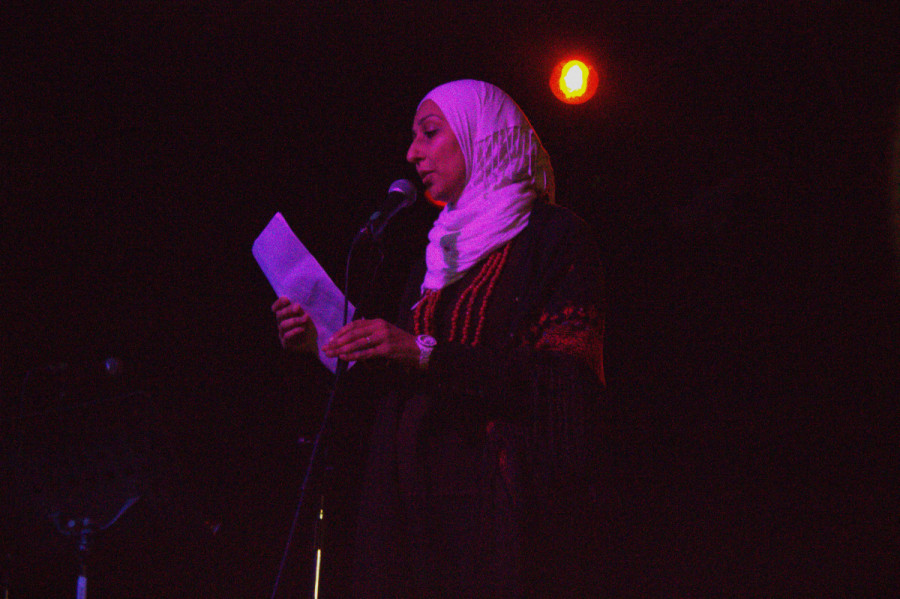
Zaazaa emphasized the need to sustain a passionate, unstructured approach to activism, steering away from rigid organization. The focus is on creating spaces for sharing, reflection and validating collective knowledge. The goal is to heal collectively, drawing on ancestral wisdom and community-based perspectives rather than conforming to Western medicine's imposed norms.
"The Circle originated from this desire for community-building, and personally, what inspires me a lot is writings like those of Bell Hooks, where she extensively discusses the issue of love as a political matter, sisterhood, how to build communities, and relearning the practice of love from a decolonial and anti-racist perspective. It's from this premise that it all started," Zaazaa added.
Moderated by the Decolonial Love Circle, Parole de résistance pour une Palestine Libre took place thanks to the collaborative efforts of three members of the collective, Nayla Naoufal, Malika Rafa, and Kamélia Hadjadj. As cultural and artistic professionals who frequently organize events, they shared insights into the event's mission and inception. Both members stressed the organic unfolding of the performances.
"After Oct. 7, Nayla and I met and came together within this circle to create a safe space for expressing our feelings,” said Rafa. “We quickly felt the need to be useful based on our capabilities, deciding to organize the event two to three weeks prior. Although we actively participate in demonstrations, our commitment and skills lie in the cultural field, where we found an organic way to contribute."
When talking about the motives of the gathering, Rafa emphasizes that Palestine is more than just occupation and Israel, urging against exclusively focusing on this discourse as it risks overlooking ancestral culture, oral traditions, family dynamics, and beauty. Rafa conveys a desire to celebrate and draw strength from this rich cultural tapestry, asserting an urgent need to preserve it amid current challenges. She believes in the interconnectedness of people's stories and words, finding strength in unity to amplify the voices of the colonized.
“We didn't have much time; we had two weeks, which is quite short to organize an event. However, we witnessed a lot of commitment, love, and solidarity, which made it possible because people wanted to speak and write,” said Naoufal. “Collaboratively, we selected voices in Montreal's cultural scene—poets, writers, and activists—who resonated with the themes of unity and healing, creating an enriching experience for all.”
“Palestine is a land of history, a land of poets. Mahmoud Darwish spoke of poems as a ‘home,’ a domicile, a place of belonging; as a mechanism of hospitality for displaced and refugee individuals,” explained Naoufal. “There is a very strong and historical connection between poetry, survival, community building, liberation, hope, and change among Palestinians. This connection extends more broadly to the Arab world and even here if we look at indigenous poetry.”
Rafa highlights the significance of Indigenous voices, citing Joséphine Bacon as an example. Drawing parallels to the history of Algeria, she notes that the resistance often involves individuals who are poets.
Amongst performers, Ellen Gabriel, Yassin (Narcy) Alsalman, Mohammad Masmoudi
Zeina Allouche, Jad Orphée Chami and a plethora of others.
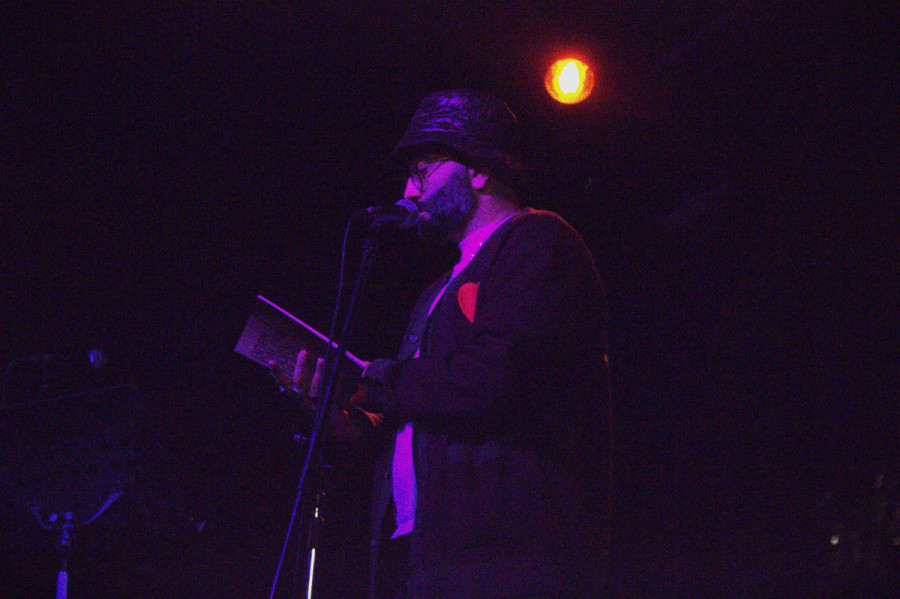
Chami, an artist-researcher with expertise in oral history performance and composition for film, theatre and dance, plays a vital role in the "Yafa" story-telling interactive piece written by his mother, Zeina Allouche. In stressing the significance of positioning ourselves, Chami highlights the impactful work of Jewish Voices for Peace, commending their ability to present Jewish perspectives as artists and scholars, thereby challenging and reshaping the narrative. He later performed a rendition of the first openly gay pop song by Lebanese indie rock band Mashrou’ Leila.
“My mother’s piece was an attempt at mixing personal testimony and narratives of displacements, but also understanding how these narratives connect with the missing and murdered Indigenous women here, and how it also articulates colonialism in Canada in general,” said Chami. “The way that we always work is that as a musician, but also as a son, I respond and accompany my mother through music as much as an accompany through music as also a witness to a mother's narrative.”
Chami applauds the inclusion of queer Arab narratives at the event, citing Mashrou’ Leila's music as a powerful example. He emphasizes the historical presence of queer poetry in the Arab world, particularly addressing love between men. He emphasizes that art must always consider socio-political contexts, highlighting beauty amid resistance, especially in Palestine's current struggle for liberation.
Mariana Leao Santos, as an attendee, highlighted the significant role events like these play in exposing valuable resources for understanding various issues. The event featured readings from books, articles, and texts written by Palestinians, providing a detailed perspective on their experiences with genocide. This not only contributes to education but also serves as a platform for individuals to express collective anger and advocate for change.
“The music that was played and sung touched my soul, it spoke more than words could,” said Mariana. “If it did what it did to me, it has the potential to touch so many more people.”
Zaazaa mentioned that upcoming workshops will extend the current themes, focusing more on issues of restorative justice within the community, with a focus on the televised genocide occurring in Palestine. She emphasized addressing challenges like bilateral violence, coping with internalized violence and navigating situations prevalent in activist movements. The workshops aim to explore alternative tools and means to build a system that moves beyond punitive logic, and reactive violence, and instead, embraces transformative and healing justice.
The next gathering will be a workshop animated by Malika Rafa, and it will explore writing and the act of speaking out. It will delve into how individuals can utilize these mediums to create new narratives, decolonize imaginations and possibly reconnect with their mother tongues.
Rafa emphasized a profound belief in the influential nature of words and stories. She sees their significance extending across political, intimate and cultural realms, emphasizing their interconnectedness and layered resonance.
“Palestinian voices, especially in the face of violence, highlight the imperative of choosing love as a form of resistance. It's a reminder that love preserves our stories, offering a powerful alternative to becoming the violence imposed on us or merely responding to it," said Rafa.
Hoda Adra, Zeina Allouche, Bengi Akbulut, Collectif des femmes pour la Palestine, Safa Chebbi, Marilou Craft, Eli Tareq El Bechelany-Lynch, Ellen Gabriel, Oula Hajjar, Harambec, Independent Jewish Voices Canada, Brintha Koneshachandra, Ehab Lotayef, Qiz7a, Sanna Mansouri, Leila Marshy, Palestinian Youth Movement, Charlie Prince, Narcy, Nour Symon, les Tisseuses, Amel Zaazaa, Qiz7a, Mohamed Masmoudi, Jad Orphée Chami, were all the artists who shared their art that night.

